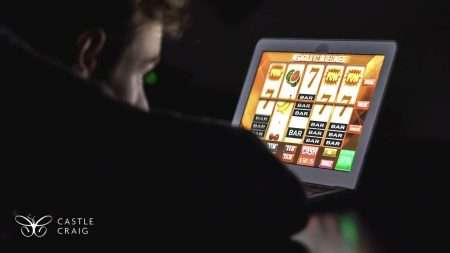Table of Contents
Women and Gambling Addiction
The number of women treated for gambling problems has doubled in recent years, according to the National Council on Problem Gambling.1 The increased visibility of women’s sports such as football is certainly a factor and the gambling industry has been quick to target this emerging market. For gamblers between the ages of 45-56, women now outnumber men with negative consequences for their mental, emotional, and financial health. With up to a million women in the UK at risk from gambling addiction, we look at some of the reasons for this and what needs to be done.

Download Our Brochure
Has Gambling Become More Female-Friendly?
The digital age has changed gambling habits, like so many other things. Most gambling now happens online, at home. You no longer have to take yourself to a race meeting or a casino to gamble, nor do you have to go to a bookie or betting shop (places that once seemed like downmarket men’s clubs) to hand over your cash. In fact, you don’t need to leave your house at all. As a result, this once the male-dominated occupation is now a unisex activity and women are turning to it as a way to relieve boredom, escape from reality, or seen as a way to supplement their household budget.
Women’s Attitudes to Gambling
Women have different attitudes and preferences when gambling to men, but the basic activity remains the same. Women seem to like more socially interactive games such as bingo or real-time blackjack and respond to games that seem relatively harmless and reassuring (bingo is the only gambling activity where women outnumber men). Conversely, however, they tend to attach more stigma to the idea of heavy or problem gambling and are often reluctant to seek help. Men on the other hand are more likely to take risks and to glamourise their behaviour.
5 Reasons Why Online Gambling Is Popular with Women
- Ease of access: it takes a minute to download a casino site to a mobile phone which can then be accessed anywhere that has a wifi connection. Betting can happen anonymously and without any human interaction at all.
- Variety: all kinds of games and sports can be found with varying degrees of risk and interaction with others. For example, a virtual slot machine is a solitary activity whereas online bingo gives a feeling of group connection.
- Bonuses and loyalty rewards: some websites are very adept at keeping their customers happy with special treatment and rewards that introduce a ‘feelgood factor’ even when the reality may be quite different.
- Sites that are user-friendly for both sexes: providers nowadays avoid overt masculinity.
- Simple but efficient payment methods: The big operators make all money transactions very simple and efficient in all the recognised ways. It suits them to do so, of course.

Free Addiction Assessment
How Does the Gambling Industry Attract Females?
Targeting women specifically requires a little more finesse. Women’s sports are much more high-profile these days anyway and the betting industry can hardly be blamed for events like the inspiring success of the Lionesses in the UEFA Women’s Euros 2022 (which reportedly led to an increase in the number of women placing bets). However, there are subtle ways of reaching this new and different female audience, such as:
- Recognising that some women have felt excluded by men from gambling in the past and suggesting it’s time for a change. For example, one US fantasy and actual sports gambling site – FanDuel, runs an advert subtly directed at women: ‘Tired of never being invited to play fantasy football? We were too…’
- Social media: companies use Facebook, Twitter, Instagram, and the like to grow their female customer base by offering friendly tips and funny but intelligent predictions with attractive visual content that is constantly updated. Customers appreciate the high-quality product and often proceed to place bets. This sort of social interaction particularly appeals to female gamblers.
- Peer pressure: The Guardian this month reported that Sportsbet (a major Australian betting company) is targeting young women on TikTok: ‘shortly before the US Super Bowl this week, Sportsbet published a TikTok video ad of a young woman drawing attention to “novelty bet” markets on Rihanna’s half-time performance. The video ran the “gamble responsibly” tag in small print.’ Although this was described as a strictly controlled trial, it has raised major concerns among regulators and gambling addiction charities who decry blatant attempts to target impressionable young women.
- Female-friendly websites: special pink colour schemes on websites are nowadays seen as too obvious a way to attract women but female empowerment is often used as a theme. For example BetMGM, a major US leisure and casino site, features ‘The Best Female Gamblers of All Time’ as do many other sites.
Is Female Gambling Stigmatised?
Women are often unfairly stigmatised for gambling which is still generally perceived to be a male activity. Society likes to feel that women should be responsible, provident, and nurturing to a greater extent than men although there is no good reason for this. There are also relatively few women involved in gambling regulation, treatment, and research. Self-help groups such as Gamblers Anonymous can often seem to be male-dominated too, which can deter some women from attending. Women who bet heavily or have a full-blown addiction may consequently feel too ashamed to ask for help.

The much-delayed UK Gambling White Paper is due to be published by the government within weeks. It has been promoted as the opportunity for sweeping changes in the gaming industry as regards standards of regulation, information, and protection for problem gamblers. Whether this will turn out to be the case remains to be seen.
Gambling Addiction Resources for Women
Women are just as prone to addiction as men and the consequences can be just as bad too. There are resources specifically for women which may help them overcome the stigma of it all and ask for help. Social media, so often cited as a driver in the surge in gambling behaviour, can also be a source of help and a means of discovering that you are not alone:
- Facebook groups such as Women Gamblers in Recovery is a support groups respecting the privacy of women and there are others.
- Twitter contains many sites where female gamblers tell their stories, such as The Girl Gambler
- There are many podcasts where female gamblers discuss their experiences with addiction and the help and support available.The Broke Girl Society is a well-known example.
- Gamblers Anonymous is a long-established and worldwide resource where you can find meetings in your area and contact details of people to talk to. They operate ‘women-preferred’ groups in some areas.
Charities That Help with Gambling Problems
- Gamcare has been offering support and advice since 1997 and operates the National Gambling Helpline. It operates a Women’s programme.
- The Royal Society for Public Health addresses Women’s gambling concerns through the Gambling Health Alliance.
- Other charities that can give helpful advice include the Young Women’s Trust and Gambling Therapy a free advice and treatment service started by the Rev Gordon Moody in 1971.
Treatment for Women Gamblers
If you are worried about your gambling behaviour you can take a quick test to find out whether you have a problem. To speak to a member of our team about treatment in complete confidence, call us at 01721 546 263. We are always ready to listen and discuss the best options available.




